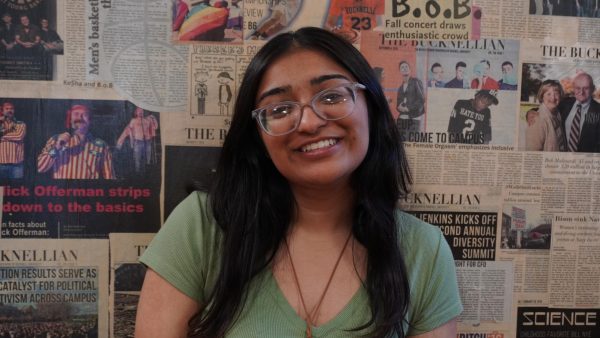As the 2024 election season approaches and the world continues to face pressing issues, I can’t help but feel disheartened by the lack of engagement among my fellow students at Bucknell. Despite being surrounded by some of the brightest minds, conversations about politics and world events often feel surface-level, apathetic or worse, insensitive.
Tuesday, Sept. 24, Religious and Spiritual Life held a vigil for Gaza. Standing there, I couldn’t shake the thought and feeling that our student body is often indifferent to political and social struggles that don’t directly affect them. As I spoke about empathy and advocacy at the vigil, I felt selfish for even thinking about how privileged we are to be here, to have access to an education so many in the world can only dream of. It hit me hard how disconnected we can be from the world’s realities.
I feel honored to study alongside peers who are so powerful in their curiosity and desire to expand their knowledge of the world, and that thirst for learning is often tied to a deep sense of empathy. But at the same time, I can’t help but feel self-conscious when speaking to so many people on campus about substantive issues that matter. While some students are eager to engage with difficult topics, others seem reluctant, as if avoiding uncomfortable conversations will make the issues disappear.
It’s discouraging to think that, at a place like Bucknell, students might shy away from raising their hand in class or discussing important matters simply because it feels socially awkward or embarrassing (and no, I’m not calling out the introverts here). It’s frustrating and leaves me wondering how we can create an environment where we listen to each other more openly.
Education should extend beyond academic knowledge. It should go hand in hand with empathy, conversation and a willingness to engage with perspectives different from our own. If we can embrace that, Bucknell can be a place where deeper understanding and meaningful dialogue thrive.
I get it—it’s awkward sometimes, and often people don’t want to be the one raising their hand or taking the initiative to discuss something controversial. But in an environment like Bucknell, where we’re supposed to be preparing ourselves to lead and change the world, this reluctance feels like a disservice to all the opportunities we’ve been given and have at our hands.
I think about the events we hold here—the panels, lectures and workshops designed to educate and open minds—and yet attendance is always a struggle unless some sort of food is involved. What does that say about our priorities? I wish we didn’t need to dangle some pizza in front of students’ faces as an incentive to engage in meaningful conversations and get them to care.
But the reality is that in life, we will all have different opinions. You’ll support one candidate, and I’ll support another. You’ll hold one belief system, and I’ll hold another. That’s completely fine. But the refusal to engage, to share ideas and perspectives, is where the problem lies. I wish we could all make just a little more space to listen, even when it’s uncomfortable or when we don’t think it directly impacts us.
On another note, I’ve often been told I overcommit myself on campus. “Malika, you do way too much!” But honestly, I sometimes wonder if I’m doing enough. For all the complaints we have about Bucknell, we, as students, also need to recognize the privilege we have here and ask ourselves: are we really making the most of this time? Just imagine how much we could grow if we started listening more—to our professors, to the people we interact with on campus and to our friends.
Speaking at the vigil for Gaza last night really struck me and reminded me that this apathy affects some of us more than others. As a minority student, I’ve gotten used to the lack of diversity, and I’ve learned how to navigate it. But there are definitely moments when it’s harder to just “push through.” There’s a real divide here: some students can afford not to care, while others feel an obligation to engage, and then there are those who have no option but to care deeply.
Bridging this gap requires more than just awareness. It requires genuine listening, empathy and support for each other, even when we don’t understand or share the same struggles. Yes, life is busy and everyone has their own issues to manage, but taking the time to listen—really listen—can be transformative.
So, as the election nears and the world continues to demand our attention, I hope we can start paying more attention to each other. Listening might not solve every problem, but it’s a strong start.




















